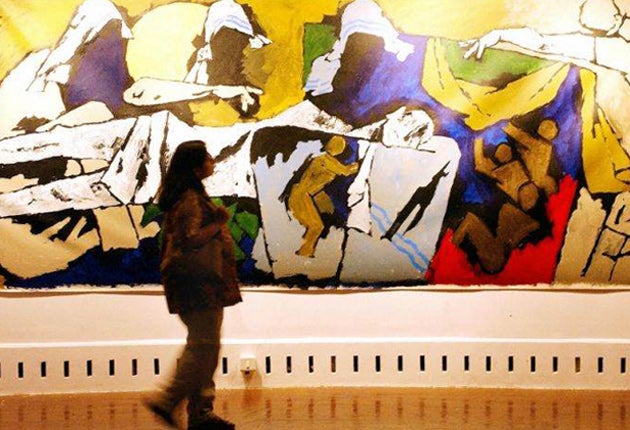Picasso of India turns his back on home
Artist takes Qatar passport after being forced into exile over nude Hindu goddesses

Your support helps us to tell the story
From reproductive rights to climate change to Big Tech, The Independent is on the ground when the story is developing. Whether it's investigating the financials of Elon Musk's pro-Trump PAC or producing our latest documentary, 'The A Word', which shines a light on the American women fighting for reproductive rights, we know how important it is to parse out the facts from the messaging.
At such a critical moment in US history, we need reporters on the ground. Your donation allows us to keep sending journalists to speak to both sides of the story.
The Independent is trusted by Americans across the entire political spectrum. And unlike many other quality news outlets, we choose not to lock Americans out of our reporting and analysis with paywalls. We believe quality journalism should be available to everyone, paid for by those who can afford it.
Your support makes all the difference.India's most famous and celebrated artist, a white-bearded veteran forced into exile because of his love of painting nude versions of Hindu goddesses, has revealed he is renouncing his citizenship.
In what many will see as a blow to India's much vaunted claim to be a stronghold of secularism and tolerance, MF Hussain, otherwise known as the Picasso of India, said he had been "honoured [with] Qatar nationality".
The 94-year-old painter, considered by many to be the founder of Indian contemporary art, left South Asia in 2006 after invoking the anger of fundamentalist Hindus because of his work.
Amid legal challenges, arrest warrants and even death threats, Mr Hussain left India and moved to Dubai, dividing his time between the Middle Eastern emirate and London. At the time of his departure from India, he said: "Matters are so legally complicated that I have been advised not to return home."
Mr Hussain had been repeatedly targeted by members of fundamentalist groups including the Bajrang Dal. In 2006, they were angered by a painting by the artist which portrayed the country of India as a naked goddess. In the mid 1990s the same groups were involved in demonstrations and protests in Mumbai after Mr Hussain painted a series of works of nude Hindu deities. His exhibitions were attacked and gallery owners threatened.
Ironically, many of his works had been created many years earlier, in the 1970s. When images of the paintings were reprinted in a magazine underneath the headline "MF Hussain: A Painter or Butcher", his home and workshop were attacked.
Precisely why the painter remains in exile is unclear. Two years ago, India's Supreme Court threw out a series of charges against him, saying: "Does the sentiment of the petitioner get scandalised by the large number of photographs of erotic sculptures which are in circulation? It is an art like the sculptures. None get scandalised looking at the sculptures." At the time, Mr Hussain, said of the court's decision: "At last, the dignity of Indian contemporary art has been upheld by the Supreme Court as expected."
Yet the painter declined to return to home. Instead he threw his energies into two separate projects, one that focused on the history of Indian culture and a second that examined the history of Arab civilisation. The latter was commissioned by Qatar's powerful first lady – Sheikha Mozah bint Nasser al Missned, wife of the emirate's ruler. The works are to be housed in a separate museum in Doha.
Whether the conferring of nationality by Qatar – something the artist reportedly did not ask for – is related to the commissions, is unclear.
However, some believe Mr Hussain is a master of self-publicity. Anubhav Nath, a leading member of Delhi's art world, said the painter was a hugely significant figure within the Indian art world and probably the country's best-known artist. "I don't know what he is trying to do," he said. "Even now he is fantastic at marketing. Of course lots of art is about marketing."
Mr Hussain's offer of citizenship was revealed by the editor of The Hindu newspaper, N Ram, who, in a front page article, wrote that the artist had scribbled the information in a black and white line drawing.
"Mr Hussain's impending change of nationality brings to a close one of the sorriest chapters in independent India's secular history," wrote Mr Ram, who has long known the artist and championed his right to live safely in India. "The conferment of Qatar nationality is an honour to his artistic genius and to the India-rooted civilisational values he represented. Nevertheless, it is a sad day for India."
Join our commenting forum
Join thought-provoking conversations, follow other Independent readers and see their replies
Comments